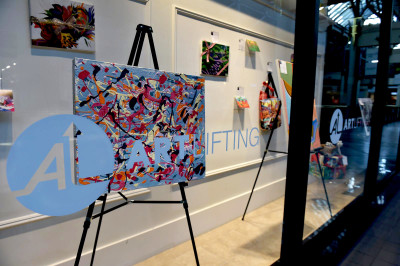
“Buy Art, Change a Life,” is the slogan proudly declared by ArtLifting, a benefit corporation that works to sell art made by the homeless or disabled communities in order to provide members with a source of income and an outlet for creative expression.
Through Jan. 31, a pop-up store inside the CambridgeSide Galleria in Cambridge will showcase original art pieces of low-income individuals and selling it to local shoppers Thursdays through Sundays. With stores in Florida, Illinois and New Jersey, ArtLifting has returned to the roots of its co-founders, siblings Liz and Spencer Powers.
“Liz has worked with the Boston homeless population for the past 10 years,” said Katie Manzi, the marketing and events director for ArtLifting. “When she would work at these shelters, she noticed that a lot of these people had amazing artistic talent, but the art would often end up in the trash or damaged.”
Taking her past experiences in stride, Liz recognized the potential for an organization with the ability to positively impact artistic, low-income individuals, Manzi said. She teamed up with her brother Spencer to make the dream a reality, and ArtLifting was born in December 2013.
“Art is beneficial therapy-wise as well, for all artists,” said Christine Cincotta, a freshman neuroscience major in the College of Arts and Sciences. “So this is now becoming an outlet for struggling people to be productive and creative.”
The mental health perspective of ArtLifting is yet another facet of its success. ArtLifting puts great focus on maintaining the artist’s integrity, which gives them confidence and has an expanding effect on other aspects of their lives that previously may have seemed unattainable.
“I have an older brother who is disabled,” said Kelly McKenna, the chief operating officer who has been with the Powers siblings since ArtLifting’s inception. “He was told for a long time that he would never graduate grade school, but he ended up graduating college with honors because my family treated him normally and just focused on what he was good at.
“Our mission is to empower people by celebrating their strengths,” McKenna continued. “These people have, for most of their lives, maybe never been told that they’re good at something and often have negative stereotypes, but we’re trying to change that.”
In addition to validation and confidence, ArtLifting gives 55 percent of the profit made off of the paintings directly to the artist. So far, five artists have gained solid housing because of their new income source and “renewed energy to fill out housing applications and job applications,” McKenna said.
According ArtLifting’s website, the New England Patriots recently purchased a few art pieces, giving the artists exposure and a recurring income.
“I think ArtLifting coming to Boston is a really smart choice, because the city has an appreciation for culture across the board,” Cincotta said.
Cincotta also noted the array of indirect impacts ArtLifting has on the surrounding population. The art that is presented creates common ground among people of different backgrounds. The medium creates a bridge between the classes, breaking stereotypes and supporting true talent.
ArtLifting also created a line of art made for workplaces, so companies have the chance to incorporate and support art with a great cause behind it.
“We like looking at [the art], we like talking about it,” Timothy Sullivan, a partner at AJU IB Investment, wrote on the ArtLifting website, “It shows our employees and visitors that this is a group of people who care about good causes.”
The inclusion of the art into more public spaces will open up a conversation about low-income individuals and begin to change the skewed public perception.
“Allowing people the chance to see what amazing art they have the ability to create is a great way to ‘rehumanize’ the homeless population,” said Joanna Munson-Palomba, the founder of Cards4aCause, a nonprofit organization that aims to keep low-income individuals’ integrity while providing monetary assistance.
As a result of ArtLifting’s efforts, there has been a double benefit, leaving consumers with more awareness and artists with more confidence. Together, these two aspects can change the futures of low-income individuals in a grander scheme. Starting small, the corporation’s growth across the nation in only three years promises that there will be more widespread benefits.
After starting with only four artists, ArtLifting now supports 47 artists. As the organization grows, consumer appreciation can expand beyond the canvas to address the stories behind the paintings.
“I’m proud to go to work every day,” McKenna said. “[I see ArtLifting] becoming a national company that does really well and helps change countless lives. [I think it will] change stereotypes about this constituency of people … and it will inspire people to do good things and to dream big.”




















































































































Maryann schuler • Jan 31, 2016 at 9:09 am
How would one submit a candidate to become part of this incredible journey?